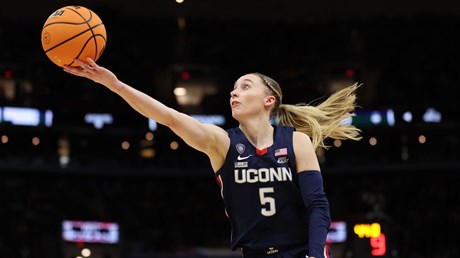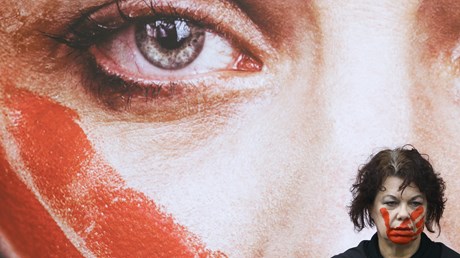Search Results for “It
News
By John W. Whitehead and Nisha Whitehead “It is the function of mass agitation to exploit all the grievances, hopes, aspirations, prejudices, fears, and ideals...Divide and Conquer: The Government's Propaganda of Fear and Fake News
|
NIL deals in college athletics present new challenges—and opportunities—for colleges and students.
 When Deverin Muff played Division I college basketball at Eastern Kentucky University, student athletes weren’t allowed to earn money off their name, image, and likeness (NIL)—their personal brand.Now he’s a professor at the university, and some of the players in his classes have agents. An NCAA policy change in 2021—heralded by Muff and other Christian athletes as a matter of fairness—allows college athletes to earn money beyond financial aid or scholarships.“This is a matter of justice, frankly. … It righted a historic wrong,” said Pepperdine University sports administration professor Alicia Jessop. College sports, especially football and basketball, draw in billions in revenue.Christians in college athletics have welcomed the change to allow NIL deals, according to interviews with CT. But they are also navigating an unknown landscape and finding challenges along the way. The NCAA itself is still reeling from the resulting shifts in the economics of college sports, passing additional NIL rules just last week.Jessop was recently teaching a class on NIL deals at Pepperdine, where she is also the faculty representative to the NCAA. One student decided to put the class into practice immediately and reached out to a sunglasses brand to pitch a deal. In a short time, the student had a free pair of sunglasses delivered.“It’s a teaching tool,” said Jessop. “They think they’re learning about NIL so they’re focused, but they’re getting a whole business curriculum put in front of them.”Under the new NCAA rules passed last week, schools can be more directly involved in NIL deals and they can offer a support system that helps educate students ...Continue reading... When Deverin Muff played Division I college basketball at Eastern Kentucky University, student athletes weren’t allowed to earn money off their name, image, and likeness (NIL)—their personal brand.Now he’s a professor at the university, and some of the players in his classes have agents. An NCAA policy change in 2021—heralded by Muff and other Christian athletes as a matter of fairness—allows college athletes to earn money beyond financial aid or scholarships.“This is a matter of justice, frankly. … It righted a historic wrong,” said Pepperdine University sports administration professor Alicia Jessop. College sports, especially football and basketball, draw in billions in revenue.Christians in college athletics have welcomed the change to allow NIL deals, according to interviews with CT. But they are also navigating an unknown landscape and finding challenges along the way. The NCAA itself is still reeling from the resulting shifts in the economics of college sports, passing additional NIL rules just last week.Jessop was recently teaching a class on NIL deals at Pepperdine, where she is also the faculty representative to the NCAA. One student decided to put the class into practice immediately and reached out to a sunglasses brand to pitch a deal. In a short time, the student had a free pair of sunglasses delivered.“It’s a teaching tool,” said Jessop. “They think they’re learning about NIL so they’re focused, but they’re getting a whole business curriculum put in front of them.”Under the new NCAA rules passed last week, schools can be more directly involved in NIL deals and they can offer a support system that helps educate students ...Continue reading... |
NIL deals in college athletics present new challenges—and opportunities—for colleges and students.
 When Deverin Muff played Division I college basketball at Eastern Kentucky University, student athletes weren’t allowed to earn money off their name, image, and likeness (NIL)—their personal brand.Now he’s a professor at the university, and some of the players in his classes have agents. An NCAA policy change in 2021—heralded by Muff and other Christian athletes as a matter of fairness—allows college athletes to earn money beyond financial aid or scholarships.“This is a matter of justice, frankly. … It righted a historic wrong,” said Pepperdine University sports administration professor Alicia Jessop. College sports, especially football and basketball, draw in billions in revenue.Christians in college athletics have welcomed the change to allow NIL deals, according to interviews with CT. But they are also navigating an unknown landscape and finding challenges along the way. The NCAA itself is still reeling from the resulting shifts in the economics of college sports, passing additional NIL rules just last week.Jessop was recently teaching a class on NIL deals at Pepperdine, where she is also the faculty representative to the NCAA. One student decided to put the class into practice immediately and reached out to a sunglasses brand to pitch a deal. In a short time, the student had a free pair of sunglasses delivered.“It’s a teaching tool,” said Jessop. “They think they’re learning about NIL so they’re focused, but they’re getting a whole business curriculum put in front of them.”Under the new NCAA rules passed last week, schools can be more directly involved in NIL deals and they can offer a support system that helps educate students ...Continue reading... When Deverin Muff played Division I college basketball at Eastern Kentucky University, student athletes weren’t allowed to earn money off their name, image, and likeness (NIL)—their personal brand.Now he’s a professor at the university, and some of the players in his classes have agents. An NCAA policy change in 2021—heralded by Muff and other Christian athletes as a matter of fairness—allows college athletes to earn money beyond financial aid or scholarships.“This is a matter of justice, frankly. … It righted a historic wrong,” said Pepperdine University sports administration professor Alicia Jessop. College sports, especially football and basketball, draw in billions in revenue.Christians in college athletics have welcomed the change to allow NIL deals, according to interviews with CT. But they are also navigating an unknown landscape and finding challenges along the way. The NCAA itself is still reeling from the resulting shifts in the economics of college sports, passing additional NIL rules just last week.Jessop was recently teaching a class on NIL deals at Pepperdine, where she is also the faculty representative to the NCAA. One student decided to put the class into practice immediately and reached out to a sunglasses brand to pitch a deal. In a short time, the student had a free pair of sunglasses delivered.“It’s a teaching tool,” said Jessop. “They think they’re learning about NIL so they’re focused, but they’re getting a whole business curriculum put in front of them.”Under the new NCAA rules passed last week, schools can be more directly involved in NIL deals and they can offer a support system that helps educate students ...Continue reading... |
Christian artists work at the intersection of music and climate change.
 Christians love to sing about creation. Hymns like “How Great Thou Art” describe the beauty of creation that moves the church to sing, “I see the stars, I hear the rolling thunder / Thy power throughout the universe displayed.”Nature can also be a source of confusion or anxiety for believers as they observe eclipses and earthquakes and try to discern God’s role or intent in their unfolding. And as climate change more visibly impacts humans, the natural world can seem increasingly hostile, even as it remains a source of inspiration and joy for the Christian.Where is God’s hand at work? And how should we respond to mysteries and chaos in our prayers and worship?British scholar Mark Porter believes the Christian imagination can hold a complex view of creation—as can music. His research looks at the intersection of music, faith, and climate change, showing ways to engage nature beyond using it as a signpost of God’s glory, contending also with its beauty, chaos, fragility, and brutality.“There’s not just one thing that nature imagery does,” said Porter. “It can do something besides inspire an individual to look to God in worship.”Porter’s forthcoming book For the Warming of the Earth: Music, Faith, and Ecological Crisis describes how faith communities and organizations are responding to climate change and environmental crises with music, such as Resound Worship’s Doxecology album, the activism of groups like Christian Climate Action (CCA), and Catholic song festivals centered on Pope Francis’ landmark encyclical, Laudato Si’.It’s not a how-to book for worship leaders looking to more explicitly address creation care or ...Continue reading... Christians love to sing about creation. Hymns like “How Great Thou Art” describe the beauty of creation that moves the church to sing, “I see the stars, I hear the rolling thunder / Thy power throughout the universe displayed.”Nature can also be a source of confusion or anxiety for believers as they observe eclipses and earthquakes and try to discern God’s role or intent in their unfolding. And as climate change more visibly impacts humans, the natural world can seem increasingly hostile, even as it remains a source of inspiration and joy for the Christian.Where is God’s hand at work? And how should we respond to mysteries and chaos in our prayers and worship?British scholar Mark Porter believes the Christian imagination can hold a complex view of creation—as can music. His research looks at the intersection of music, faith, and climate change, showing ways to engage nature beyond using it as a signpost of God’s glory, contending also with its beauty, chaos, fragility, and brutality.“There’s not just one thing that nature imagery does,” said Porter. “It can do something besides inspire an individual to look to God in worship.”Porter’s forthcoming book For the Warming of the Earth: Music, Faith, and Ecological Crisis describes how faith communities and organizations are responding to climate change and environmental crises with music, such as Resound Worship’s Doxecology album, the activism of groups like Christian Climate Action (CCA), and Catholic song festivals centered on Pope Francis’ landmark encyclical, Laudato Si’.It’s not a how-to book for worship leaders looking to more explicitly address creation care or ...Continue reading... |
Statistics reveal that three out of ten women in the country have experienced abuse at some point in their lives. Theologians and leaders weigh on how to turn churches into safe places for them.
 For too many Brazilian women abused by their spouses, the answer church leaders have given to their suffering is Ephesians 5:22: “Wives, submit yourselves to your own husbands.”“It’s the cruelest phrase in the Bible,” one woman told journalist Marília de Camargo César, as she records in O Grito de Eva (Eve’s Cry). “[Church leaders] teach it in a twisted way, without taking into account the historical context, traditions, culture,” she explains, identified in the book only as Professor Regina.Three out of ten Brazilian women suffer domestic violence at some point in their lives. The country has high rates of violence against women, ranking fifth in the world. Last year, a national hotline received calls from an average of 245 women each day reporting some kind of violence. All this in a nation where women comprise m ore than half (58%) of evangelicals.Recent allegations of abuse in North American churches have generated discussion in the Brazilian church around the issue, but churches and denominations have standard procedures or adopted best practices for addressing domestic violence. Yet in an environment where many survivors don’t report violence because of shame and fear of retaliation, evangelical churches have the opportunity to be places of shelter and guidance for hurting women.Given these realities, CT invited six evangelical leaders who are experts on the subject to answer the following question: “What should church leaders do when a female congregant says she has been a victim of abuse or violence?”Answers have been edited for clarity and style.Continue reading... For too many Brazilian women abused by their spouses, the answer church leaders have given to their suffering is Ephesians 5:22: “Wives, submit yourselves to your own husbands.”“It’s the cruelest phrase in the Bible,” one woman told journalist Marília de Camargo César, as she records in O Grito de Eva (Eve’s Cry). “[Church leaders] teach it in a twisted way, without taking into account the historical context, traditions, culture,” she explains, identified in the book only as Professor Regina.Three out of ten Brazilian women suffer domestic violence at some point in their lives. The country has high rates of violence against women, ranking fifth in the world. Last year, a national hotline received calls from an average of 245 women each day reporting some kind of violence. All this in a nation where women comprise m ore than half (58%) of evangelicals.Recent allegations of abuse in North American churches have generated discussion in the Brazilian church around the issue, but churches and denominations have standard procedures or adopted best practices for addressing domestic violence. Yet in an environment where many survivors don’t report violence because of shame and fear of retaliation, evangelical churches have the opportunity to be places of shelter and guidance for hurting women.Given these realities, CT invited six evangelical leaders who are experts on the subject to answer the following question: “What should church leaders do when a female congregant says she has been a victim of abuse or violence?”Answers have been edited for clarity and style.Continue reading... |



 Links
Links  Articles
Articles  Blogs
Blogs  Videos
Videos  News
News  Colors
Colors 

 New links
New links

